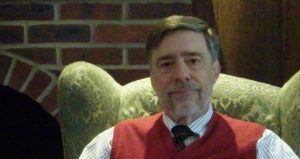
In the new book, How To Pray, Zach Kincaid – the editor – selects Lewis’ 1945 essay, “Work and Prayer,” from God in the Dock for the second chapter. When C. S. Lewis became a Christian in 1931, he was already familiar with philosophical problems people have had with Christianity. We learn in a letter Lewis wrote to his brother, Warren, in 1932, that he had read about one such problem in Boswell’s Life of Johnson. Boswell was troubled by arguments people made against the idea that our prayers can have any effect or influence upon God (Collected Letters, Feb 21st 1932). In light of such doctrines as God’s impassability, his omniscience, and his decrees, prayer seems pointless or illogical.
Lewis’ approach to this problem was simply to recognize that prayer is only one action of all the actions we humans take in our lives. Do we stop doing anything at all because we know God is omniscient or has already decreed what comes to pass? He uses the illustration of the custom of asking someone at the dinner table to pass the salt. Do we stop asking for the salt because, “If God wanted me to have it, he would have determined for me to have it?” He demonstrates that the above argument against prayer is an argument leading to absurdity.
His argument against this particular objection to petitionary prayer seems to have been quite satisfactory to Lewis. In fact, he uses the illustration of passing the salt in this essay, “Work and Prayer,” and in his 1963 book, Letters To Malcolm. In the book, Lewis says that the thorough-going Determinist will still ask you to pass the salt. Whatever our philosophical problems with how our actions may or may not affect God or our destinies, we are going to go ahead and keep acting consistently with our experience of cause and effect, whether we are Christians or not. So why shouldn’t we pray?
In fact, we must pray, as Lewis avers. Our Lord has commanded us to do so. The practical result, he thus sums up well in one sentence in chapter vii of Letters to Malcolm: “Whatever the theoretical difficulties are, we must continue to make requests of God” (p. 38, Fount pb).
In an attempt to help with the theoretical difficulty – because it’s still going to pester us – Lewis suggests in the ’45 essay that God, consistently along with his purposes, allows a bit of “free play” in the circumstances of this world to provide us with a degree of dignity as his human creatures. In support, Lewis quotes a famous line by Pascal on prayer and dignity about this (HTP, p. 20), which he also quotes in Letters to Malcolm, but for a different purpose (Letter x, p. 55, Fount).
Lewis makes a brilliant connection in “Work and Prayer” with the classic Christian phrase laborare est orare, which he translates “work is prayer.” If any of our acts can produce events, then we may consider how the whole of our lives are lived in light of God’s providence, whether at “work” – such as weeding a garden – or in the more outwardly religious act of prayer. He does add a caveat about prayer, however: prayer will not automatically yield a particular result. God reserves the right to the final say so in this case.
I love the way Lewis so practically handles this problem about prayer. I am also impressed with how Kincaid adds to the chapter an excerpt from a 1949 letter which deals with a slightly different theoretical problem. Instead of considering the ordering of events, this problem deals with the nature of time and God’s omniscience. The answer is still very much the same: “Don’t let the theoretical bother you.” But Lewis also beautifully makes one of his characteristic twists and redirects the way his correspondent has been thinking about God’s eternity. Instead of thinking about what God has known up to this point, consider that he is hearing “now.” Live and pray in the present with an eternal God. Lovely.
Reference: C. S. Lewis, How To Pray: Reflections and Essays, (New York, HarperOne, 2018), ISBN-13: 978-0062847133.
————————–
Please note that the content and viewpoints of Rev. Beckmann are his own and are not necessarily those of the C.S. Lewis Foundation. We have not edited his writing in any substantial way and have permission from him to post his content.
————————–
 The Rev. David Beckmann has for many years been involved in both the Church and education. He helped to start a Christian school in South Carolina, tutored homeschoolers, and has been adjunct faculty for both Covenant College and the University of Tennessee, Chattanooga. He founded the C.S. Lewis Society of Chattanooga in 2005. He has spoken extensively on C.S Lewis, and was the Director of the C.S Lewis Study Centre at The Kilns from 2014-2015. He is currently a Regional Representative for the C.S. Lewis Foundation in Chattanooga.
The Rev. David Beckmann has for many years been involved in both the Church and education. He helped to start a Christian school in South Carolina, tutored homeschoolers, and has been adjunct faculty for both Covenant College and the University of Tennessee, Chattanooga. He founded the C.S. Lewis Society of Chattanooga in 2005. He has spoken extensively on C.S Lewis, and was the Director of the C.S Lewis Study Centre at The Kilns from 2014-2015. He is currently a Regional Representative for the C.S. Lewis Foundation in Chattanooga.